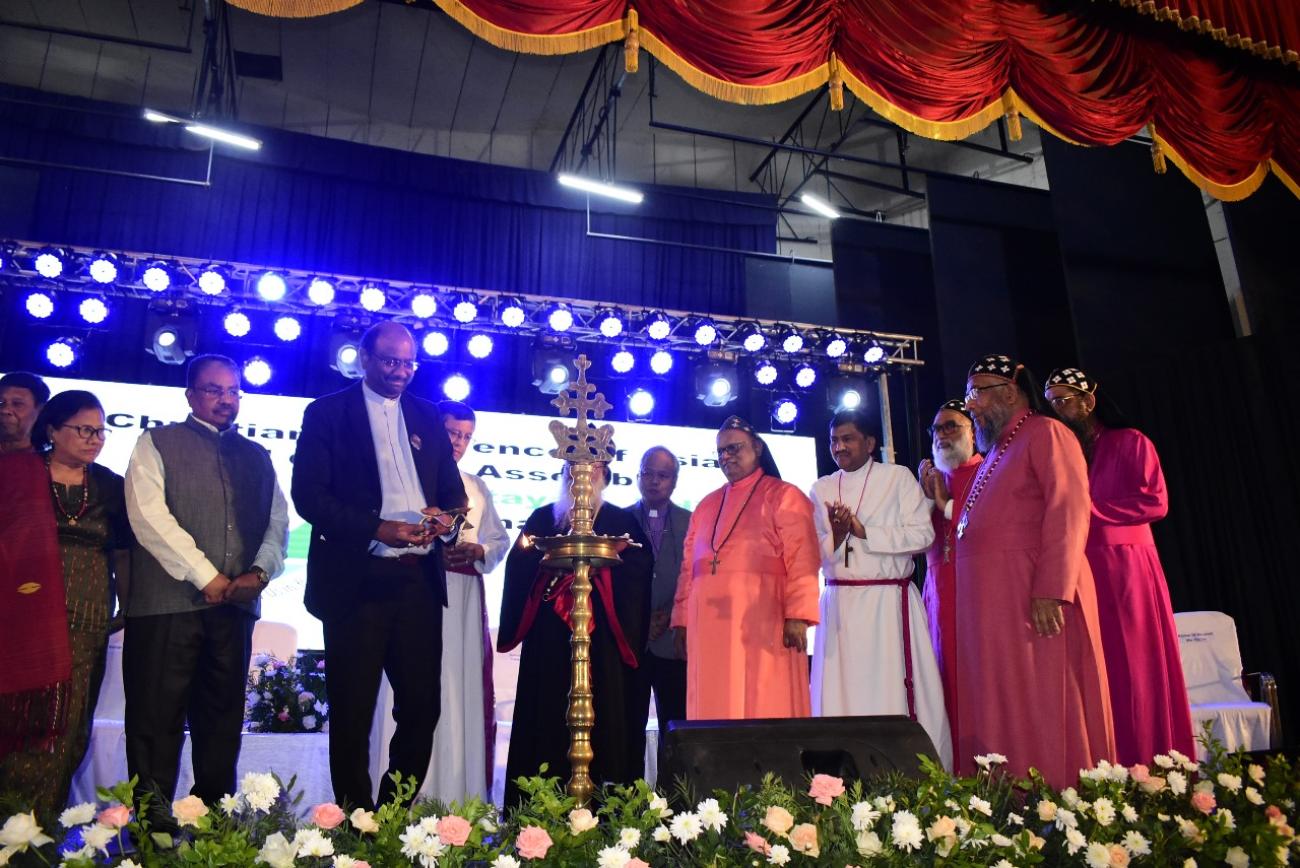CCA General Assembly opens with spirit of ecumenism in celebrative worship and inauguration ceremony

Kottayam, India: The 15th General Assembly of the Christian Conference of Asia opened with celebrative worship and inauguration at Kottayam, Kerala, a citadel of ancient Christianity in India in the afternoon on 28 September 2023.
The 15th General Assembly will be anchored on the theme, “God, Renew Us in Your Spirit and Restore the Creation”.
Over 500 registered General Assembly participants joined with many people at the Mammen Mappillai Hall in Kottayam, India, for the celebrative worship and inauguration of the Assembly.
The worship began with the echoes of drum rolls, a procession displaying diversity, and symbolic representations of light, cross, and scripture. The congregation tuned to the symphony sung by the choir as they joined voices proclaiming, “We are the household that gathers round Jesus, sharing one table, one cup, and one light”.
With the traditional greetings of the ‘Namaskaram’ (‘Welcome’) chanted in Malayalam, the local language of about 40 million people, and with traditional lamps and flowers, the worship leaders entered the auditorium. This was followed by a choreographic performance in the Indian classical dance style to the accompaniment of prayers adoring the God of all creation.
The worship was based on a carefully prepared liturgy with Asian cultural norms in all their diversity, accompanied by a variety of Asian hymns and music; the liturgical prayers highlighted the essence of the Assembly theme, the renewal, and restoration of God’s creation.
An indigenous Indian woman theologian, Rev. Idan Topno from the Gossner Evangelical Lutheran Church of Chotanagpur and Assam in India, delivered the homily at the opening worship.
Speaking from her local indigenous experience, Rev. Topno narrated that a majority of the members of the Gossner Evangelical Lutheran Church are members of the indigenous tribes or communities of Munda, Oraon, Kharia, Ho, and Karbi in north and north-eastern India, and the lives of these indigenous communities are immersed in nature and they embrace all God’s creation.
“The environmental crisis has affected this area of indigenous communities and three pillars of their Adivasi (tribal) identity – jal, jangal, jameen – namely, water, forest, and land are under constant threat.
“For the Adivasi, the natural habitat is everything but around us keep emerging new life-threatening problems, to which we are unable to respond. We Adivasi Christians are facing spiritual bankruptcy,” Rev Topno said.
She used the scripture to comment on the spiritual bankruptcy and lack of life in abundance; yet highlighting the remnants of unspoken harmony between humans and the environment.
“At this Assembly, when our hearts say, ‘God, renew us in your spirit and restore the creation’, the Spirit gives us hope to enter more fully into the life of Christ… The Spirit’s intentions are to transform our deepest desires into a yearning for God’s truth and God’s justice and our prayers become that vehicle. The Spirit wants to conform us to the image of Christ, so that we can truly become sons and daughters of God––sons and daughters who carry out God’s will in the world. That is why prayer is so powerful. Not only is prayer inspired by the Spirit’s intercession for us, but also in the process of prayer our deepest desires are transformed into yearning for God’s purpose for us and the world around us,” stated Rev. Topno at the opening worship.
Inauguration of the Assembly
The 15th CCA General Assembly was inaugurated with the lighting of the lamp by the General Secretary of the World Council of Churches, Rev. Dr Jerry Pillay, and the heads and leaders of five member churches of the CCA in the South Indian state of Kerala together with the CCA Officers.
The CCA General Secretary, Dr Mathews George Chunakara, welcomed all participants to Kottayam, a small but historic town, that was hosting the second General Assembly ever to be held in India. Kottayam was the venue of the Second World Christian Youth Conference organised by the World Council of Churches in 1952.
The first time that the CCA General Assembly was held in India was four decades ago, for the fourth Assembly in Bangalore in 1981.
“Dear ecumenical pilgrims, your being here at the 15th General Assembly of the CCA is a demonstration of our individual and collective commitment. Your being here also shows our common obligation to contribute to strengthening the ecumenical movement which strives for the unity of all God’s people, and all God’s creation. Our deliberations under the Assembly theme, ‘God, Renew Us in Your Spirit and Restore the Creation’, shall affirm and reaffirm our commitments at this Assembly. Your presence at the 15th General Assembly proves that we continue to live up to our faith and trust in God’s abundant mercies, assurances, and commitment,” said the CCA General Secretary.
The introductory remarks were shared by the CCA Moderator, Bishop Dhiloraj Canagasabey. Welcome and greetings addresses and benedictory addresses were delivered by five heads and leaders of the CCA member churches in India, namely, His Holiness Dr Baselios Marthoma Mathews III from the Malankara Orthodox Syrian Church, His Beatitude Dr Theodosius Mar Thoma Metropolitan of the Malankara Mar Thoma Syrian Church, Rt. Rev. Dr K. Reuben Mark, Acting Moderator of the Church of South India, His Eminence Joseph Mor Gregorios Metropolitan from the Malankara Jacobite Syrian Orthodox Church, and His Beatitude Cyril Mar Baselios Metropolitan from the Malabar Independent Syrian Church.
Words of greetings were extended by the General Secretary of the National Council of Churches in India, Rev. Asir Ebenezer, the WCC President from Asia, Rev. Dr Henriette Hutabarat Lebang, and the Chairperson of the Assembly Local Host Committee, His Grace Dr Abraham Mar Paulos.
Closing remarks were offered by Bishop Reuel Norman Marigza, the Vice Moderator of the CCA.
For more photos (photo gallery) please click here: 15th CCA General Assembly Opening and Inaguration, 28 September 2023










